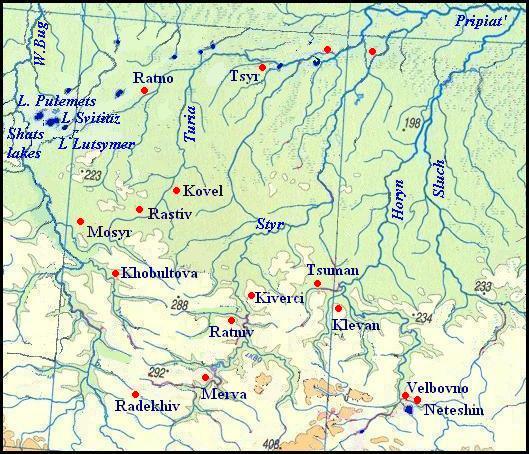
Ancient Teutonic Place Names in Volin
The area, located between the rivers Western Bug and Sluch, south from the Upper Pripyat, that is, the historical region Volyn (at present Volins’ka oblast’ or Volin Region) was inhabited by the ancient Germans (Teutons) in the 2nd mill BC. More later this country has been settled by the Slavic tribe of Dulebs or Dudlebs. This ethnonym derives from W.G. Deudo and laifs (EDU and EDR). The first part of the group’s name means “Teutons”, from which the eponymous designation for modern Germans (Deutsch) derives; the second part means “the rest” (Got. laiba, O.Eng. làf). Thus the word Dulebs may be translated as “the remnants of the Teutons.”

As is true of Ukraine as a whole, the vast majority of place names in Volyn are naturally of Slavic origin; nevertheless, the traces of more ancient settlers in the region were found. Most of the Germanic place names turn out to be in the area of the Shats lakes, a region with a population dating from antiquity. The name of these lakes may originate from O.U.G. scaz, “money, cattle,” or Ger. Schatz, "treasures.” One may speak more confidently of the Teutonic origin behind the names of the village Pulemets and Lake Pulemetske. We can interpret them to mean “full measure of grain” (Ger. volle Metze, O.U.G. fulle mezza – EWDS). The somewhat chimer name for another lake, Lucymer, may be understood to mean “the small sea” (Ger. lütt, lütz, O.U.G. luzzil "small;” O.U.G. mer; Ger. Meer, "sea"). Here attention should be drawn to the fact that while similar words exist in other Germanic languages, we shall deal henceforth with the common Germanic features of these languages – in particular, with the transition t>z, which is unique to German. The names of Lake Svitjaz’ and the village Pulmo, located on the banks of the former, may have Germanic origins as well, though Slavic roots remain probable to some degree.
However, the most persuasive evidence of a Teutonic settlement in Volhynia comes from the mysterious name of the village Velbovno in Rivno Region, located adjacent to Ostroh on the right bank of the river Horyn’. The name consists of two ancient Germanic words: O.U.G. welb-en, “to erect the arch,” and ovan, "furnace.” An arching furnace made of stone is a rather commonplace item, but nevertheless may have served a special purpose. In this place along the right bank of the Horyn’, impassable bogs span many kilometers. As such, the furnace may have been used to smelt iron from marsh ore. Located near to Velbovno is the city of Neteshin, the name of which may also have Germanic origins. The second part of the word best approximates asca, "ashes" (Ger. Asche), but no logical connection to the first part has been found in German. Several options suit for decoding of the name, but the most suitable explanation is as "ash coop" whereas Germ Netz (from Germanic net) "network" and eschen "ash, made of ash." Flexible ash branches are well suited for the production of fish-traps.
We now look at several other examples of toponyms for which no compelling definition has been found based on Slavic languages, but which can be etymologized on the basis of German:
The village of Farinky, east of Kamin' Kashirsky – Ger Fähre from *fahreja "to transfer”;
The town of Kiverci – Ger. Kiefer, M.U.G. kiver, "jaw, chin;”
The town of Klevan of Riwne dictrict – Ger kleben, OE cleofian “to glue”;
The town of Kovel – Ger. Kabel, “destiny, lot,” M.L.G. kavel-en – “to draw lots;”
The village of Merva near Berestechko Volyn Region – Ger Merle, O.H.G merla “blackbird, merle”;
The village of Mosyr, northwest of the town of Volodymyr Volyns’kyj, New Mosyr and Old Mosyr, southwest of Rožyšča in Volin Region – O.U.G. masar, "maple;”
The village of Nevel, southwest of the Belarusian city Pinsk – Ger. Nebel, "fog;”
Lake Nobel and the village of Nobel, located west of Zarične in Rivno Region on a peninsula of the lake – Ger. Nabel, O.U.G. nabalo, “navel;”
The village of Pare on the Prastyr Strait – Ger. Fähre “ferry, ferry ;”
The town of Radekhiv, Lviv Region – Ger Rad “wheel”, Echse “axle”;
The town of Radyviliv, Rivne Region – Ger Rad “wheel”, Eibe, Ger īw- “willow”;
The village of Rastov, west of Turijs’k – O.U.G. rasta, "stall;”
The town of Ratno, the village of Ratniv near Lutsk – M.H.G roten “to stub”;
The river Styr, the tributary of the Pripjat’ – Ger. Stör, O.U.G. stür(e), "sturgeon;”
The river Strypa the tributary of the Dnister, which spring lies on the border of the Teuton area – M.N.G. strīpe “a stripe”;
The village of Khobultova, east of Volodymyr Volyns’kyj – Ger. Kobold, “demonic being;”
The river Tsyr and the village of Tsyr – Ger. Zier, "ornament,” and O.U.G. zieri, "good.”
The village Tsuman, to east of Kivertsi – Ger. zu Mann “to a man”.
This record of Teutonic toponyms in Volyn should not be taken as an exhaustive list, as many more known place names may be added to them.











